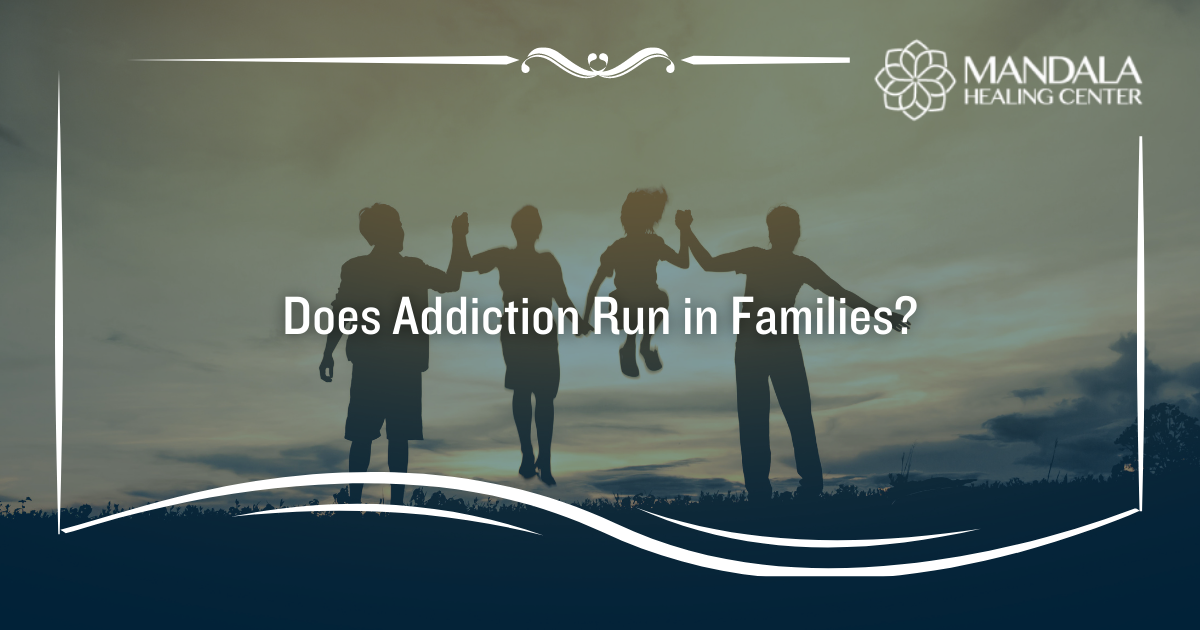Drug and alcohol addiction can cause serious harm to a person’s mental and physical well-being, as well as damage their most important relationships and prevent them from living the life they’d choose. People with addiction often require extensive, comprehensive treatment and support to overcome the condition and regain control over their lives.
But how does addiction develop? The condition is complex and involves every aspect of a person’s life. Addiction experts believe that many factors contribute to someone developing dependence on drugs or alcohol. People who study or live with addiction sometimes wonder, is addiction genetic? Some research suggests a link between a person’s biology and their risk of developing an addiction.
Understanding the connection between genetics and addiction may help people get the treatment and support they need to overcome addiction. If you or someone you love need help to move past addiction to drugs or alcohol, reach out to the Mandala Healing Center specialists today.
Is Addiction Genetic?
Addiction often derails a person’s life, threatens their safety, and can cause significant long-term damage to their health. Recovery is challenging but possible–and understanding the roots of your addiction can help you find the comprehensive, holistic treatment you need to overcome it.
There is a stigma surrounding substance use and addiction. Many people believe those living with addiction are lazy, have flawed characters, or are choosing to use drugs or alcohol. But this couldn’t be farther from the truth. Addiction is a complex condition, and no one decides to live with it.
So, where does addiction come from–and is addiction genetic?
When talking about “genetics,” we’re referring to the genes passed down from your parents. Genes are the part of DNA that determine specific traits, such as eye color. Both biological parents contribute 50% of their child’s genes.
People who study addiction believe a person’s genetics may play a role in their likelihood of developing an addiction. In fact, family studies that include identical twins, fraternal twins, adoptees, and siblings suggest that as much as half of a person’s risk of becoming addicted to nicotine, alcohol, or other drugs depends on his or her genetic makeup.[1,2]
Does Addiction Run in Families?
Having a parent or other close relative with addiction seems to increase a person’s likelihood of developing the condition. Some may wonder if they are doomed to live with addiction because they have a close biological relative who lives with the condition. But is addiction genetic, or are there other factors to blame?
Since biological parents pass genes down to their children, some genetic diseases can be inherited. But addiction is a complex condition with deep roots in many parts of a person’s life. Genetics are not the only thing contributing to a person’s chances of developing an addiction. Addiction experts think a person’s environment may affect how some genes are expressed–including the genes responsible for raising the risk of addiction.
To answer the question, “does addiction run in families?” it’s essential to consider the genetic and hereditary parts of drug and alcohol addiction and the other factors that play a role in substance abuse and dependence.
Other Aspects of Addiction
Addiction experts believe that a person’s addiction arises from many sources. While genetics can play a role in a person’s addiction, it isn’t likely to be the only factor. Here are some of the other risk factors believed to contribute to an addiction.
Early adverse life experiences
People who experience adverse events during childhood may be more likely to develop an addiction later in life. These adverse events may include:
- Trauma
- Abuse
- Neglect
- Witnessing abuse or assault
These and other adverse childhood experiences are linked to impairments in social skills, impulse control, decision-making, and other essential skills, which can increase the odds someone will begin to use drugs and alcohol.
Inadequate parenting
Experiencing a lack of emotional warmth, parental drug use, neglect, and poor modeling during childhood can increase a person’s risk of developing substance use and addiction later in life.
Environment
Living in an environment with certain characteristics can increase a person’s likelihood of using drugs and alcohol and developing an addiction. These environmental risk factors include:
- Low socio-economic status
- High crime
- Using drugs and alcohol at an early age
- Having easy access to drugs and alcohol
- Widespread substance use in the community
- High unemployment
Growing up in communities where drug and alcohol use are the norms may increase a person’s likelihood of developing a substance use disorder later.
Mental illness
Certain mental health conditions, including schizophrenia, bipolar disorder, depression, and personality disorders, are linked to a greater likelihood of substance use and addiction.
Inflammation
Some recent research suggests systemic inflammation may increase a person’s risk of developing certain mental health conditions and addiction. While more research needs to be completed on this discovery, healing inflammation may someday be an important aspect of addiction treatment.
Find Help Now
You don’t have to battle addiction alone. Caring, comprehensive addiction treatment can help you overcome addiction so that you can live the lifestyle you choose–instead of the one that drugs and alcohol choose for you.
Reach out to the Mandala Healing Center specialists now to learn about starting one of our holistic treatment programs or with any questions you may have.
References:












